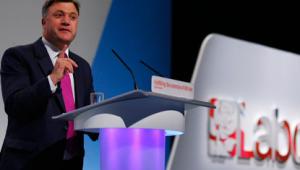By Lucy Phillips
27 September 2010
Former chancellor Alistair Darling launched a scathing attack on the coalition’s economic policy at the Labour Party conference today.
Darling accused the Conservatives of taking a ‘dishonest approach’ to spending cuts. ‘The cuts they are making are the same old Right-wing ideology dressed up as necessity,’ he said.
‘To hear them speak, you might conclude it was the Labour government’s investment in new hospitals and schools which somehow brought the US and global economy to the brink of disaster.’
In his address to party members in Manchester, Darling went on to accuse the Liberal Democrats of hypocrisy. ‘They went within a week from saying Tory plans for spending cuts were an unjustifiable risk, to claiming they were the only way forward.
‘No matter how many times they try to justify their extraordinary change of mind, it doesn’t wash.’
Darling as chancellor planned to halve the deficit within four years, while the coalition plans to eliminate the structural deficit by 2015/16.
Darling said: ‘Don’t let anyone tell you there is no difference between us and the coalition government… the approach they have chosen – and it is a choice – is a huge gamble with growth and jobs.’
By contrast, Labour’s approach was ‘measured and balanced’, he claimed.
He backed comments made by new party leader Ed Miliband that Labour now needed to set out a more detailed plan for reducing the deficit. ‘We need to stay in the centre ground of British politics. We must be credible and confident to regain the people’s trust. And with Ed as leader we will do that.’
Darling, who is now stepping down from frontbench politics, also defended his record as chancellor under the premiership of Gordon Brown.
He denied the public deficit was ‘a result of extravagant spending or reckless decisions’, blaming it on the financial crisis and the recession that followed. ‘Yes, we did take decisive action to stop businesses closing, people losing their homes and thousands more being thrown out of work.
‘And, without this action, borrowing would not have been lower in the long run but higher,’ he said.



















